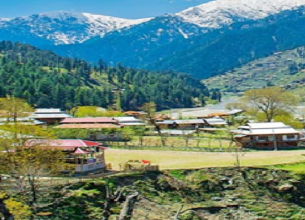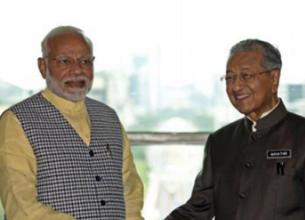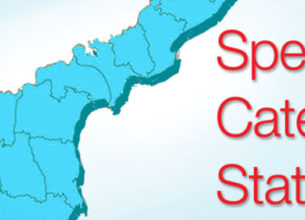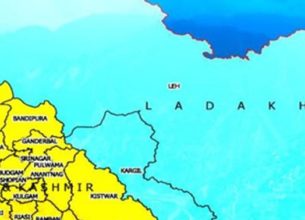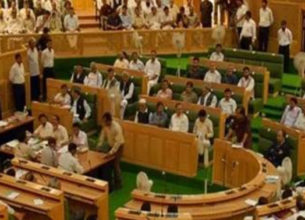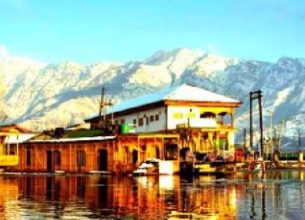ABROGATION OF ARTICLE 370.
05, Aug 2019
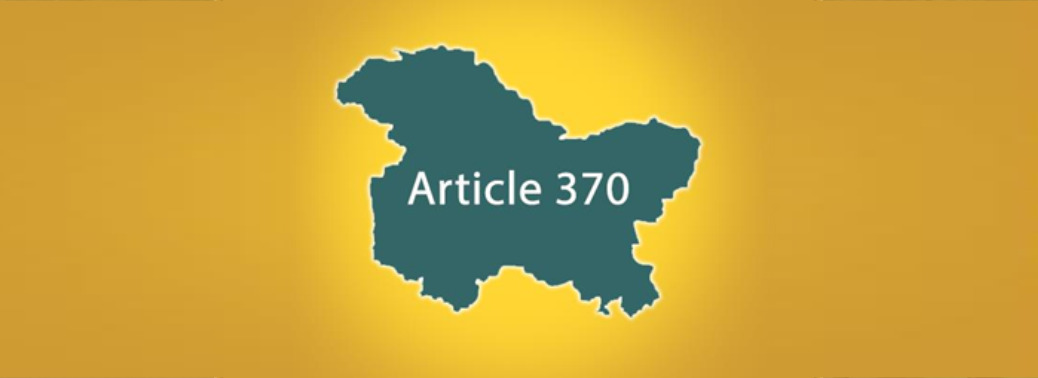
Prelims level : Constitution
Mains level : GS2A - Indian Constitution- historical underpinnings, evolution, features, amendments, significant provisions and basic structure.
Context:
- The Centre on Monday scrapped Article 370 of the Constitution that grants special status to Jammu and Kashmir, with an order saying “it shall come into force at once”.
- The abrogation follows the Centre introducing the Jammu and Kashmir Reorganization Bill in Parliament.
What is Article 370?
- Included in the Constitution on October 17, 1949, Article 370 exempts J&K from the Indian Constitution (except Article 1 and Article 370 itself) and permits the state to draft its own Constitution.
- It restricts Parliament’s legislative powers in respect of J&K.
- For extending a central law on subjects included in the Instrument of Accession (IoA), mere “consultation” with the state government is needed.
- But for extending it to other matters, “concurrence” of the state government is mandatory.
- Background of IoA
- The IoA came into play when the Indian Independence Act, 1947 divided British India into India and Pakistan.
- For some 600 princely states whose sovereignty was restored on Independence, the Act provided for three options: to remain an independent country, join Dominion of India, or join Dominion of Pakistan — and this joining with either of the two countries was to be through an IoA.
- Though no prescribed form was provided, a state so joining could specify the terms on which it agreed to join.
- The maxim for contracts between states is pacta sunt servanda,e. promises between states must be honoured; if there is a breach of contract, the general rule is that parties are to be restored to the original position.
Constitutional Law Background:
- The political agreement of 3 June 1947 to partition the Indian sub-continent was crystallized in British statutes – the Indian Independence Act, 1947 and the modified Government of India Act, 1935.
- While India is an ancient civilization, modern-day India and Pakistan are creations of these statutes and have chosen to abide by such constitutional law governing the sub-continent.
- There is no doubt about the legitimacy of an ‘India’ and a ‘Pakistan’ as created by these statutes, and both countries have been recognized by the UN as sovereign member states.
- Kashmir Status:
- The princely state of J&K was a sovereign state as of 15 August 1947 as per this constitutional law creating India and Pakistan.
- It was in terms of such law that the Ruler of J&K, who was the sole repository of power in the state, chose to accede to India through the accession instrument of 26 October 1947.
- Such accession by the Ruler, though unconditional, was only in matters of external affairs, communications and defence and certain ancillary matters.
- The accession instrument expressly declared that nothing therein would affect the continuance of the sovereignty of the Ruler in or over J&K.
- Exception in Kashmir:
- Unlike other princely states acceding to India, the sovereign Ruler of J&K did not thereafter merge the territory of the state into the Indian Union nor cede further subjects to India.
Arrangement between India and Kashmir:
- Even so, it was not contemplated that a ruler would remain the constitutional head of a state within a democratic Indian republic.
- Hence, there was to be a transfer of power from the Ruler of J&K to a duly elected state constituent assembly.
- And so, the Indian Constitution itself contemplated in Article 370 that J&K would have its own constitution framed by its own constituent assembly.
- Since there was still to be a transition from monarchy to a form of government that was to be decided by a state constituent assembly that was yet to be set up, and which would also finally determine the constitutional relationship of J&K with the Indian Union, Article 370 was described as a temporary provision and placed under Part XXI of the Indian Constitution which deals with “Temporary, Transitional and Special Provisions”.
- Accordingly, the Indian Constitution was made applicable to J&K only through Article 370, and it was through Article 370 that Article 1 of the Constitution (which lists the States of India and their territories) was extended to J&K.
Kashmir status in Indian Union:
- The state Constituent Assembly, subsequently set up in 1951, regarded the constitutional relationship of J&K with India as one of an autonomous republic within the Indian Union.
Delhi Agreement, 1952:
- This relationship was later crystallized in the Delhi Agreement, 1952, which was duly ratified by the Indian Parliament and the state Constituent Assembly, and which inter alia permitted the state legislature to make laws conferring special rights and privileges upon the state subjects.
- The President of India, with the concurrence of J&K, exercised the power under Article 370 to issue the Constitution (Application to Jammu & Kashmir) Order, 1954, which inserted provisions like Article 35A to give effect to the Delhi Agreement and also applied further Articles of the Indian Constitution to J&K (with modifications).
Article 3 of constitution of India and Kashmir status:
- Another provision inserted by this 1954 Order was the proviso to Article 3 of the Indian Constitution.
- This provision mandates that “no Bill providing for increasing or diminishing the area of the State of Jammu and Kashmir or altering the name or boundary of that State shall be introduced in Parliament without the consent of the Legislature of that State.”
- In other words, J&K has not only Not merged its territory into the Indian Union, it has explicitly preserved its territorial integrity as also identity. That, incidentally, also rules out trifurcation of J&K without its consent.
Can Article 370 can be Abrogated?
- Article 370 itself mandates a recommendation of the state Constituent Assembly before the President of India can declare Article 370 inoperative.
- The state Constituent Assembly dispersed after framing the Constitution of Jammu & Kashmir in 1957, without, however, making any such recommendation.
- Nor can a recommendation of the state legislature (unlikely as it may be) be a substitute for the requisite recommendation of the state Constituent Assembly.
- It therefore follows that the competence of any organ of the Indian State to declare Article 370 inoperative no longer exists.
What is assumption for abrogation of Article 370:
- Article 370 as an obstacle to full integration of J&K into India plead that the abrogation of Article 370 (and Article 35A) would remove the preferential treatment accorded to the state, permit citizens from across the country to settle in J&K and buy land there, and assimilate the people of J&K into the mainstream.
- Arguments in Oppose
- Honouring the autonomy guaranteed by Article 370, asserting that it is Article 370 that makes J&K a part of India, and should Article 370 be abrogated, the accession of J&K to India itself gets undone.
- The contention is that Article 1 of the Indian Constitution (which lists the States of India) is made applicable to J&K by Article 370 itself, and if Article 370 goes, so does the application of Article 1 of the Indian Constitution to J&K, which would render J&K independent of India.
Experts opinion:
- J&K became an integral part of India not by virtue of Article 370 of the Indian Constitution but through the accession instrument of 26 October 1947 executed by its sovereign Ruler in favour of India in terms of the law that created modern-day India.
- The 11-Judge Bench of the Supreme Court held in Madhav Rao (1973) that the accession instrument was an Act of State on the part of the sovereign ruler of a princely state and bound all concerned.
- The accession made by a sovereign J&K to a sovereign India, therefore, cannot be re-opened and is binding on all, whether in Srinagar or in New Delhi.
- Since the basis of the relationship between J&K and the Indian Union is the accession instrument, and not Article 370, the abrogation of Article 370 (even if it was constitutionally permissible) would not undo the accession or make J&K independent of India.
- Consequences from such abrogation
- Far from assimilation, such abrogation would revert the relationship between J&K and India to the terms of the accession instrument and confine New Delhi’s jurisdiction to only matters of external affairs, communications and defence and ancillary matters, with the rest of the matters falling within the jurisdiction of the current constitutional polity of J&K.
- After all, should Article 370 go, so would all the Presidential Orders under Article 370, most of which had the effect of extending New Delhi’s fiat to the state, often to an extent that would be impermissible for other parts of the country.
- The obvious constitutional consequence of abrogating Article 370 would be to enhance the state’s autonomy, which would hardly have been New Delhi’s intention. Indeed, it would be a classic case of New Delhi cutting off its nose to spite its face.




